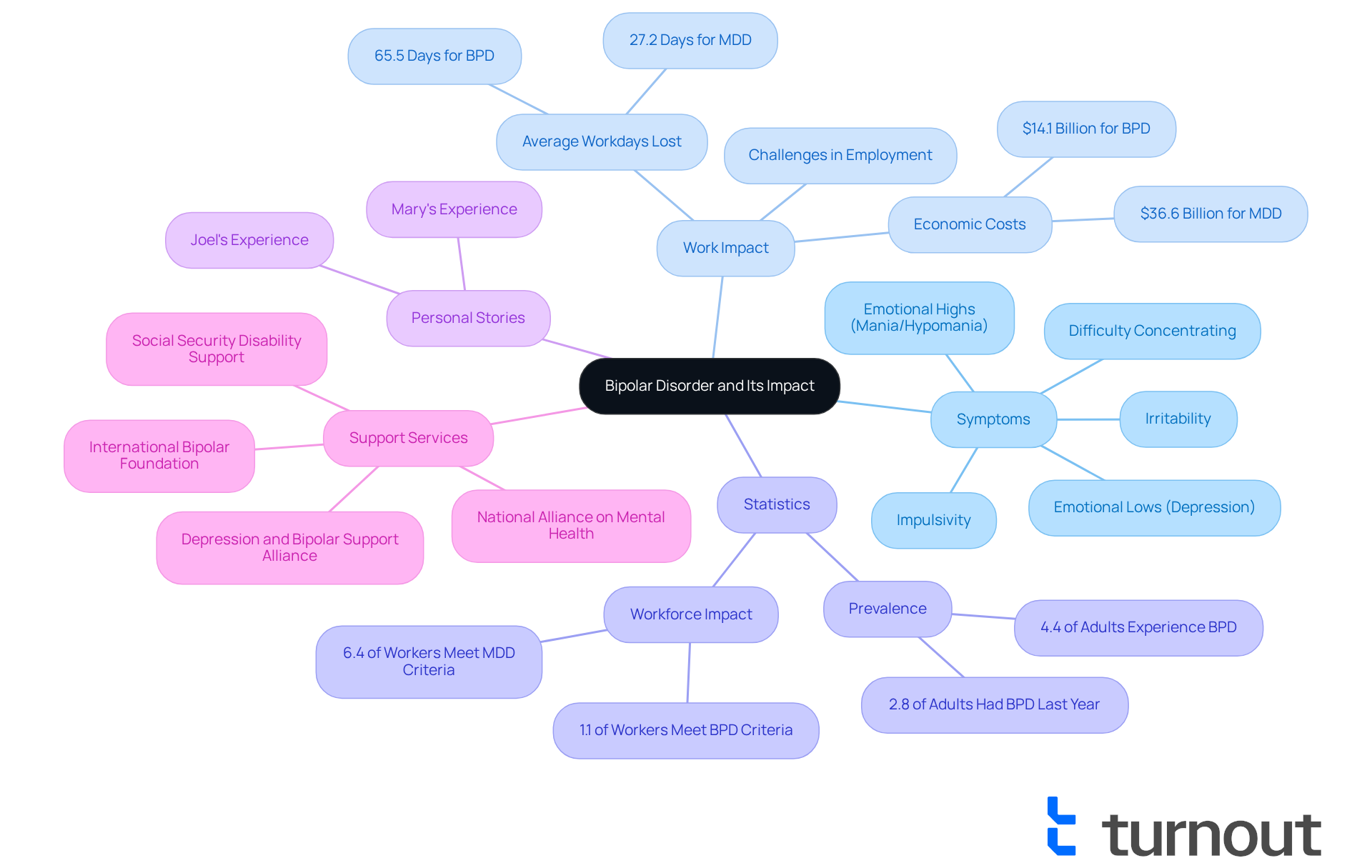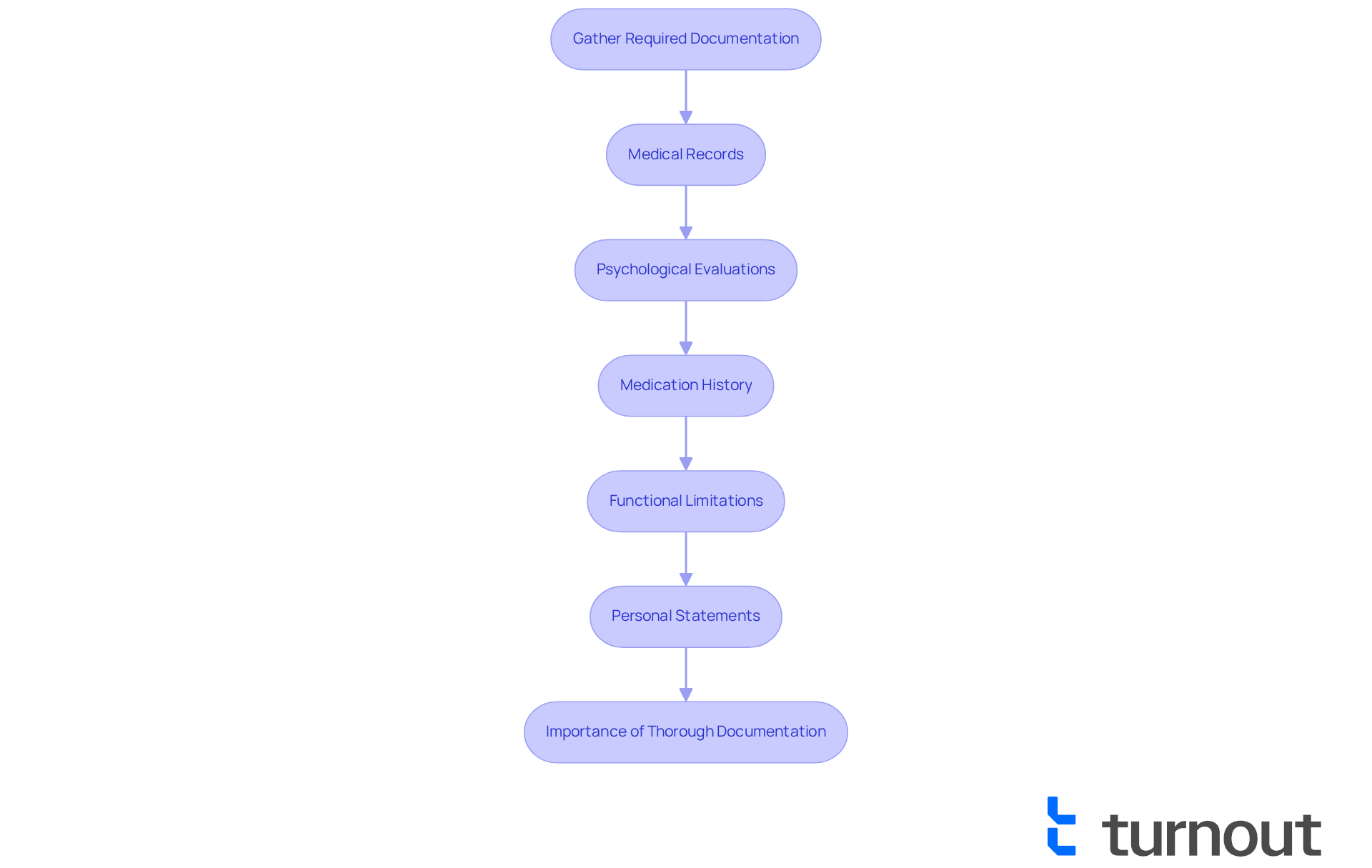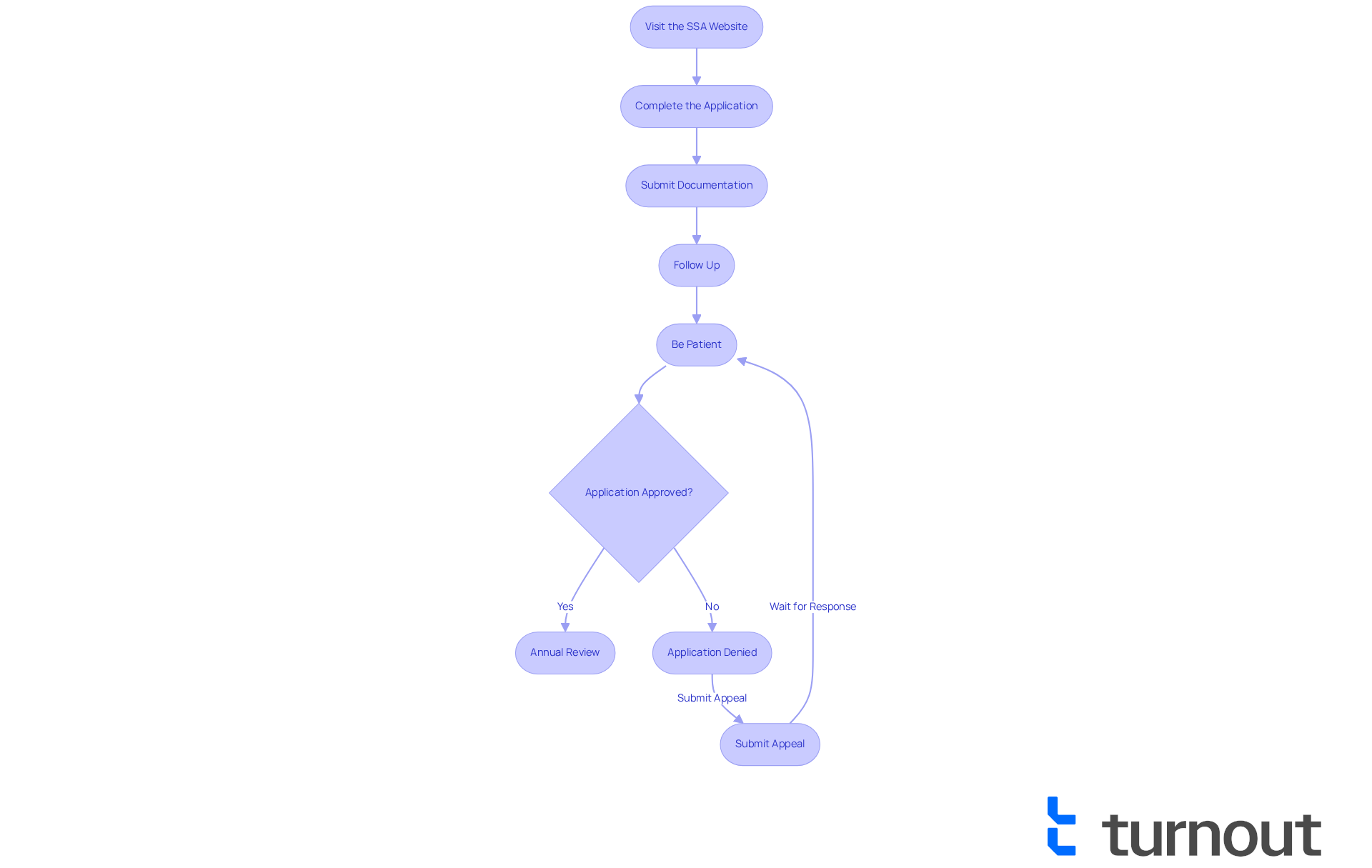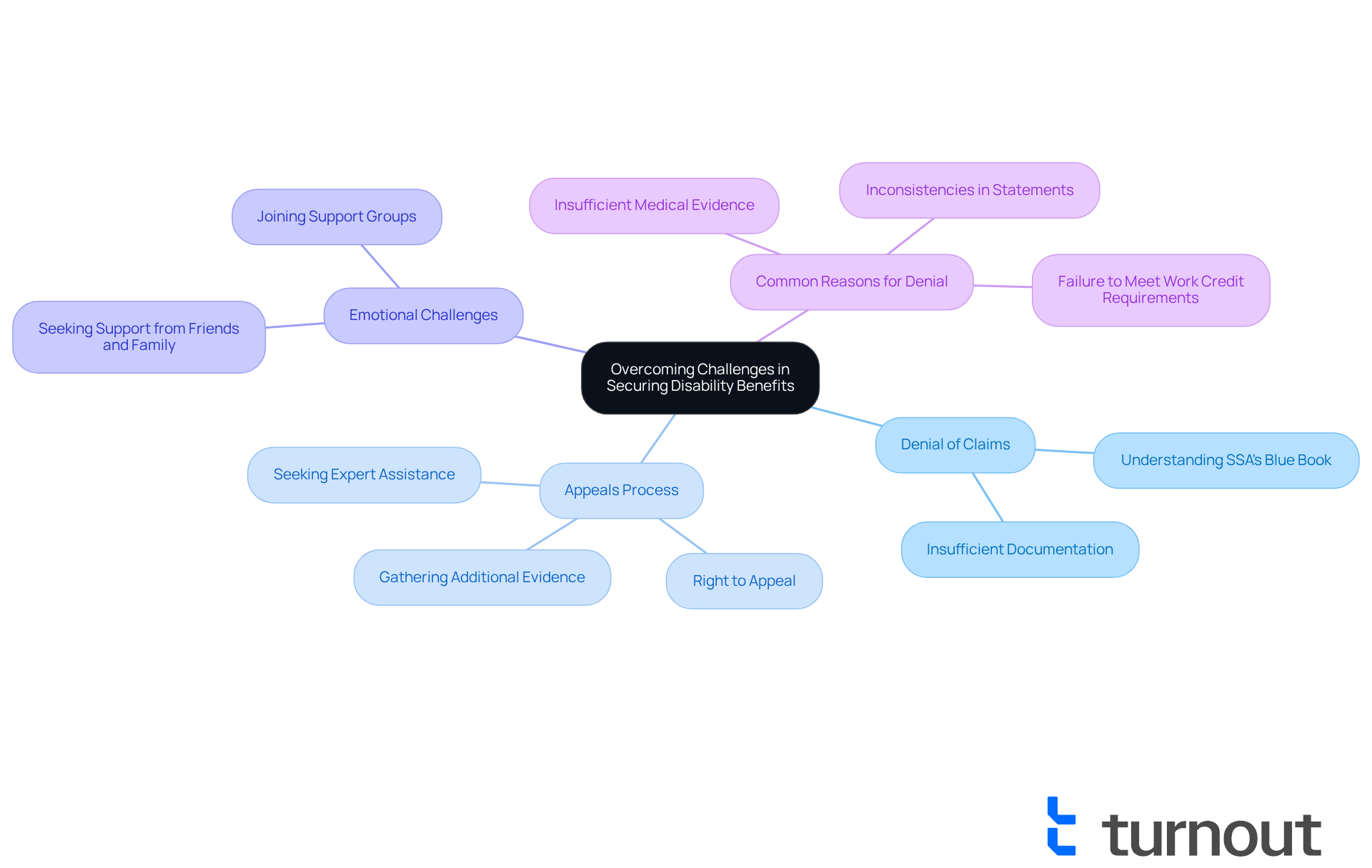Overview
Bipolar disorder can qualify for disability benefits, especially if it significantly restricts your ability to perform daily work activities for at least 12 months. We understand that navigating this process can feel overwhelming. That's why it's crucial to have thorough documentation, including:
- Medical records
- Personal statements
to demonstrate the severity of your condition. This documentation is essential in showing how bipolar disorder impacts your work performance. Remember, this is a vital step for a successful application to the Social Security Administration. You're not alone in this journey; we're here to help you every step of the way.
Introduction
Bipolar disorder affects millions, manifesting through debilitating mood swings that can disrupt daily life and employment. We understand that grappling with these symptoms can be incredibly challenging. This raises an important question: does bipolar qualify for disability benefits?
In this guide, we will explore the critical steps to secure these benefits, offering insights into:
- The documentation process
- The application journey
- Strategies to overcome common hurdles
With the stakes high and the process often overwhelming, know that understanding how to navigate this complex landscape is essential for you as you seek the support you deserve.
Understand Bipolar Disorder and Its Impact
Bipolar condition is a mental health issue that many face, characterized by extreme mood swings, including emotional highs (mania or hypomania) and lows (depression). These fluctuations can profoundly affect your daily functioning and ability to maintain employment. Symptoms such as irritability, impulsivity, and difficulty concentrating are critical indicators of how this condition can hinder work performance. This can lead to struggles with consistent work schedules, stress management, and effective communication with colleagues, all of which can significantly impact job stability.
We understand how challenging it can be. Recent studies indicate that mood instability is linked to an average decline of 65.5 workdays annually for each impacted employee, emphasizing the significant effect on productivity. The projected yearly human capital decline resulting from manic-depressive illness in the U.S. workforce is around $14.1 billion. Mental health experts highlight that the signs of mood instability can hinder focus, education, and recall, further complicating your capacity to function efficiently in your job.
Real-life examples illustrate these challenges: individuals like Mary, who experiences extreme fatigue and irritability, may find it difficult to engage in work activities, leading to frequent absences. Similarly, Joel, a 20-year-old engineering student, has exhibited bizarre behaviors and paranoia, resulting in his withdrawal from classes and a decline in academic performance. It's common to feel overwhelmed by these experiences.
The occurrence of mood instability in the U.S. workforce is significant, with approximately 4.4% of adults anticipated to encounter this condition at some stage in their lives. Grasping these dynamics is essential for determining whether bipolar qualifies for disability benefits. Understanding how the Social Security Administration evaluates ongoing symptoms and substantial functional limitations is important for those asking, does bipolar qualify for disability.
Importantly, Turnout is not a law firm and does not provide legal advice. Instead, Turnout employs trained nonprofessional advocates to help individuals with mood fluctuations navigate the complexities of Social Security Disability (SSD) claims. This approach ensures that you can effectively seek the financial assistance you need, acknowledging the profound effects of your condition on work performance and overall quality of life. Remember, you are not alone in this journey; we're here to help.

Gather Required Documentation for Disability Claims
To effectively seek disability benefits related to a mood condition, it is vital to collect thorough documentation that clearly illustrates the seriousness of your situation. We understand that this process can feel overwhelming, but gathering the right materials can significantly strengthen your case. Key documents include:
- Medical Records: Obtain detailed records from healthcare providers that outline your diagnosis, treatment history, and any hospitalizations related to bipolar disorder. This documentation is crucial, as the Social Security Administration (SSA) requires evidence of ongoing treatment to support your claim.
- Psychological Evaluations: Include assessments from mental health professionals that describe your symptoms and their impact on your daily life. These evaluations help illustrate the functional limitations caused by your condition.
- Medication History: Document all medications prescribed, including dosages and any side effects experienced. This information can provide insight into the severity of your symptoms and the effectiveness of your treatment.
- Functional Limitations: Prepare a statement explaining how mood variability impacts your capacity to perform tasks, including specific instances of obstacles encountered in past employment. Highlighting these limitations is vital, as the SSA evaluates your capacity to perform past work or any suitable employment.
- Personal Statements: Consider writing a personal narrative that describes your experiences with bipolar disorder and its impact on your life. Personal accounts can add depth to your application and help convey the challenges you face.
Research shows that assertions backed by thorough documentation possess a considerably greater success rate. For example, individuals who supply comprehensive medical records and detailed assessments are more likely to obtain approval for their requests. Engaging with disability advocates from Turnout can enhance your understanding of the documentation process, ensuring that you present a compelling case to the SSA. Remember, Turnout is not a law firm and does not provide legal advice; they utilize trained nonlawyer advocates to assist clients in navigating SSD claims. It’s crucial to recognize that to establish whether bipolar qualifies for disability, your condition must greatly restrict fundamental job activities, and the application process may require several months to more than a year. You are not alone in this journey, and we’re here to help you every step of the way.

Navigate the Application Process for Disability Benefits
Navigating the application process for disability benefits can feel overwhelming. We understand that this journey may be filled with uncertainty, but following these steps with the support of Turnout can help streamline your experience:
- Visit the SSA Website: Begin by visiting the Social Security Administration (SSA) website. Here, you can access the online application or find your nearest SSA office.
- Complete the application by providing detailed information about your medical condition, work history, and specifically how bipolar disorder affects your daily life, as this will help determine if bipolar qualifies for disability. It's vital to be thorough, as many initial requests for disability benefits are denied due to insufficient information.
- Submit Documentation: Attach all necessary documentation, including medical records, treatment history, and personal statements from healthcare providers, to support your claim. The SSA evaluates applications based on the severity of symptoms and their impact on your ability to work. Remember, when considering whether bipolar qualifies for disability, it is deemed disabling only if it significantly hinders gainful activity for at least 12 months.
- Follow Up: After submitting your application, keep track of its status by contacting the SSA or checking online. Be prepared to provide additional information if requested, as the SSA may need further details to process your request. Turnout is here to assist you in navigating these communications effectively.
- Be Patient: The review process can take several months, and many applicants experience delays. Stay informed and be ready to respond to any inquiries from the SSA. It's common to feel anxious during this time. Statistics indicate that individuals with mood instability are unable to work for approximately 65.5 days each year on average. Additionally, applicants have 60 days to submit an appeal if their initial application is rejected, underscoring the importance of timely and organized submissions. If approved for mental illness benefits, you can expect annual case reviews, so understanding the ongoing nature of your benefits is crucial.
Real-life examples show that individuals who maintain consistent treatment and provide detailed documentation have a higher chance of success in their requests. Gathering medical records and relevant information before applying is essential for a successful application. Furthermore, some individuals with mood variability may benefit from flexible work arrangements, offering hope and options for managing their condition. With Turnout's expert guidance, you can navigate the complexities of SSD requests more effectively. Remember, you are not alone in this journey; we’re here to help.

Overcome Challenges in Securing Disability Benefits
Individuals with bipolar disorder often find securing disability benefits daunting, raising the question of whether does bipolar qualify for disability. You are not alone in facing these challenges. Here are some common obstacles and strategies to help you navigate this journey:
- Denial of Claims: It's disheartening to learn that many initial claims are denied, often due to insufficient documentation. To strengthen your case, ensure that all medical records and supporting documents are comprehensive. They should clearly illustrate how your condition impacts your daily life and work capabilities.
A lack of understanding can make it common to feel overwhelmed by the criteria for disability benefits, particularly regarding whether does bipolar qualify for disability. Familiarizing yourself with the SSA's Blue Book listings for mental disorders can help you understand if and how does bipolar qualify for disability, ensuring your application meets the necessary requirements.
-
Appeals Process: If your request is denied, remember that you have the right to appeal. The appeals process can be extensive, but gathering additional evidence and seeking assistance from experts specializing in disability matters can significantly enhance your case. Many individuals have successfully navigated this process by bolstering their requests with thorough medical records and personal narratives that highlight the effects of their condition.
-
Emotional Challenges: The application process can be emotionally taxing. It's essential to seek support from friends, family, or support groups to help manage the stress associated with applying for benefits. Engaging with others who understand your situation can provide both emotional relief and practical advice.
-
Common Reasons for Denial: Understanding the frequent reasons for denial can help you prepare a stronger application. Insufficient medical evidence, inconsistencies in statements, and failure to meet work credit requirements are among the top reasons claims are denied. By addressing these issues proactively, you can improve your chances of success.
We understand that this journey can be challenging, but taking these steps can lead you toward securing the support you deserve. Remember, we're here to help you every step of the way.

Conclusion
Bipolar disorder presents significant challenges that can profoundly impact an individual's ability to maintain stable employment and daily functioning. We understand that navigating these complexities can be overwhelming, especially when seeking disability benefits. Recognizing how bipolar disorder qualifies for these benefits is crucial, and knowing the steps to secure the financial support can greatly alleviate some of the burdens associated with this condition.
This article outlines critical steps for:
- Gathering documentation
- Navigating the application process
- Overcoming common obstacles faced by individuals with bipolar disorder
Key insights include:
- The necessity of comprehensive medical records
- Psychological evaluations
- Personal statements that clearly illustrate how the disorder impacts daily life and work capabilities
It’s common to feel emotional challenges during this journey, and seeking support is essential, particularly when dealing with potential claim denials and the appeals process.
Given the profound effects of bipolar disorder on individuals and their families, approaching the disability benefits application with diligence and support is essential. Engaging with advocates, understanding the documentation process, and staying informed about the criteria set by the Social Security Administration can significantly enhance the chances of a successful claim. By taking proactive steps and seeking assistance, you can navigate this complex process and secure the benefits you deserve, ultimately leading to improved quality of life and stability. Remember, you are not alone in this journey; we’re here to help.
Frequently Asked Questions
What is bipolar disorder?
Bipolar disorder is a mental health condition characterized by extreme mood swings, including emotional highs (mania or hypomania) and lows (depression), which can significantly affect daily functioning and work performance.
How does bipolar disorder impact work performance?
Symptoms such as irritability, impulsivity, and difficulty concentrating can hinder consistent work schedules, stress management, and effective communication, leading to decreased job stability and productivity.
What are the statistics related to bipolar disorder's impact on workdays?
Studies indicate that mood instability is linked to an average decline of 65.5 workdays annually for each affected employee, contributing to a projected yearly human capital decline of around $14.1 billion in the U.S. workforce.
What are some real-life examples of how bipolar disorder affects individuals at work or school?
Individuals like Mary may experience extreme fatigue and irritability, making it hard to engage in work activities and leading to frequent absences. Similarly, Joel, a 20-year-old engineering student, may exhibit bizarre behaviors and paranoia, causing him to withdraw from classes and decline academically.
How prevalent is bipolar disorder in the U.S. workforce?
Approximately 4.4% of adults in the U.S. are anticipated to experience bipolar disorder at some point in their lives.
Can bipolar disorder qualify for disability benefits?
Understanding how the Social Security Administration evaluates ongoing symptoms and substantial functional limitations is crucial for determining whether bipolar disorder qualifies for disability benefits.
What assistance does Turnout provide for those with bipolar disorder?
Turnout employs trained nonprofessional advocates to help individuals navigate the complexities of Social Security Disability (SSD) claims, providing support in seeking financial assistance related to the effects of their condition.




